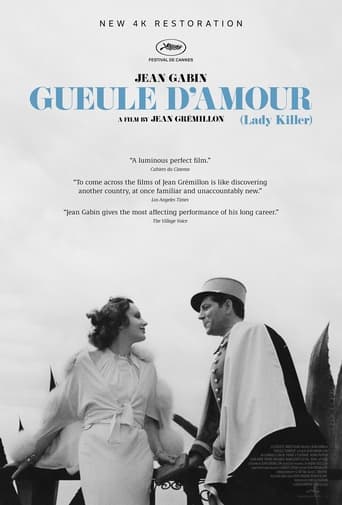Richard Chatten
Dashing legionnaire Jean Gabin loses his head over a heartless high maintenance gold-digger played by Mireille Balin. She has no intention of leaving her sugar daddy and it all ends in tears in this glossy star vehicle reuniting the leads of 'Pépé le Moko'. Handsomely mounted and sumptuously photographed by veteran German cameraman Günther Rittau, it looks good but the material scarcely merits the money, talent and care that has gone into its production. The characters are unsympathetic and a thuddingly trite coincidence concerning Gabin's old army buddy René Lefevre is worked into the plot in order to generate a suitably melodramatic conclusion. Gabin's fall from grace because of his infatuation vaguely recalls Emil Jannings and Marlene Dietrich in 'The Blue Angel', with Balin's immaculately dressed femme fatale more poison maiden than great bitch.
palmiro
This film was unique on a couple of counts: 1) it clearly sanctions a crime of passion as something that does not cry out for retributive justice--it elicits sympathy for the perpetrator of the crime much more than for the victim; 2) there is a kind of male bonding between Gabin and his doctor "copain" which suggests that friendship between men can attain a measure of intimacy never possible in their relations with women--and this without a hint of homosexual eroticism. Maybe it was France of the Popular Front that made it all possible.
William J. Fickling
I never heard of this film until I saw it at a recent Gabin retrospective. I loved it, even if it is a case of directorial excess. The film would have been much more subtle if it had ended with Lucian (the Gabin character)returning to Orange and watching the new regiment of soldiers coming in, realizing that he was no longer the "lover boy." But then, it wouldn't have been as much fun.
dbdumonteil
Nowadays,when critics speak of Gremillon,they often mention "remorques","lumière d'été" "le ciel est à vous" (which ran into difficulties at the end of the war as "le corbeau" ,but on opposite grounds:Clouzot's work was deemed too black when Gremillon's was judged too "white" ,too "pétainiste".)"gueule d'amour" is rarely talked about.So "gueule d'amour' is unfairly dismissed as "melodrama".Sure it is,but ,as Stahl,Sirk,Minelli and countless others have shown in America,melodrama is a valuable genre.Gabin, a good-looking legionnaire,is under a bitch's spell.This woman (Balin) dreams of luxury,abetted by an unscrupulous hateful mother.So she stalks rich preys,and Gabin,even if she loves him ,is nothing more than a pastime for her.The best scenes deal with Balin in one of her rich lover's flat ,with her despicable mama who acts as if she's at home,and Gabin's helpless attempts to make her comprehend what true love means.But it's too late,she's rotten to the core.The last part is less convincing:the M.O. of Gabin's former regiment tells his mate he's found love with a wonderful woman.Guess who she is?That's the biggest flaw of the movie and the ending is too predictable.By and large,"Gueule d'amour" is an absorbing movie which influenced Yves Allégret .The mother character is close to Jane Marken's in"manèges" (1949).Spiteful gossips will tell it's the same misogyny.



